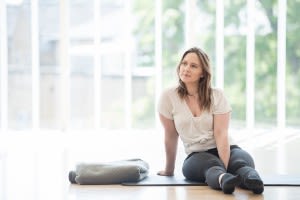WHAT IS ANXIETY
We all experience anxiety at some point, and we all know how nervous something like a big presentation can make us feel. But once it's over, those nerves disappear as part of the body’s natural response to a situation.
Imagine living with that heightened anxiety every day. This is exactly what it's like for someone with an anxiety disorder. Described as a constant feeling of worry or fear that lasts for a long time, it comes as no surprise that anxiety can affect you both physically and mentally.
According to time-to-change.org.uk, in any given week around 6 in every 100 of us will suffer from a General Anxiety Disorder. So it's time we understood what anxiety is and how we can help those who are suffering from what some have called a silent illness.
Understanding anxiety
Generalised anxiety disorder (GAD)
There are several different types of anxiety but GAD is the most common. Whatever you do, you simply can't shake the feelings of worry on a general day-to-day basis. There are no specific triggers but it can make you feel as though things in life are worse than they really are.

What are the symptoms of anxiety?
Anxiety will be different for different people and the symptoms depend on the type of anxiety that you may be experiencing, you may:
- Lack energy and feel weak
- Feel dizzy
- Feel frozen to the spot
- Breathe faster than normal
- Feel ‘tense’
- Find it hard to concentrate
- Sweat more than usual
- Lose your appetite
- Feel your heart is beating faster than usual
- Get a churning feeling in your stomach
- Feel like you can’t cope
- Feel a lack of control
What can you do if you feel anxious?
Once you recognise the signs of anxiety, it's important to try and manage it. The following top tips will help:
- Be active – Go for a run to give yourself headspace or try something like Pilates, yoga or tai chi class to help you be active and relax.
- Take time out – Struggling to see the mist through the trees? Take time out to distract yourself from whatever is concerning you or making you feel anxious. From getting some fresh air to reading a book, find an activity that relaxes you.
- Talk about it – Talk to friends and family about what is making you feel worried or anxious. If you can’t talk to a friend or family member, call a helpline such as the Samaritans on 116 123.
- Practice breathing techniques – Breathe slowly and deeply to help breathe the fear away. Stay calm and try not to panic.
- Plan or manage your time – Plan your journey, where you’re going, your route there and allow for extra time so you’re not rushing.
- Reward yourself – When you’ve faced what it is that is making you feel anxious, treat yourself. This could be something as simple as having a bath or setting aside time to read a book or watch a film/ boxset.
Should these symptoms worsen, book an appointment with your GP.
Other types of anxiety disorders
There are many other types of anxiety which we have detailed below.
Panic Attacks
Panic attacks are characterised by extreme physical or emotional responses to fear. You may find it hard to breathe, your heart may pound faster than usual, you may feel faint or nauseous. These attacks may last anywhere between 5-20 mins and should pass.
Phobias
Phobias manifest themselves as an intense fear of a specific thing. It could be anything from a certain type of animal to a specific event.
Obsessive Compulsive Disorder (OCD)
OCD is where your anxiety leads you to specific obsessive behaviours. This could be in the form of unwelcome thoughts, urges or doubts that regularly appear unwarranted. It could also be around a compulsion to complete repetitive actions that a person feels are entirely necessary.
Post-traumatic Stress Disorder (PTSD)
PTSD is an anxiety related to a traumatic event that you may have witnessed or experienced. PTSD may involve experiencing flashbacks and resurface the feelings at that moment in time.

